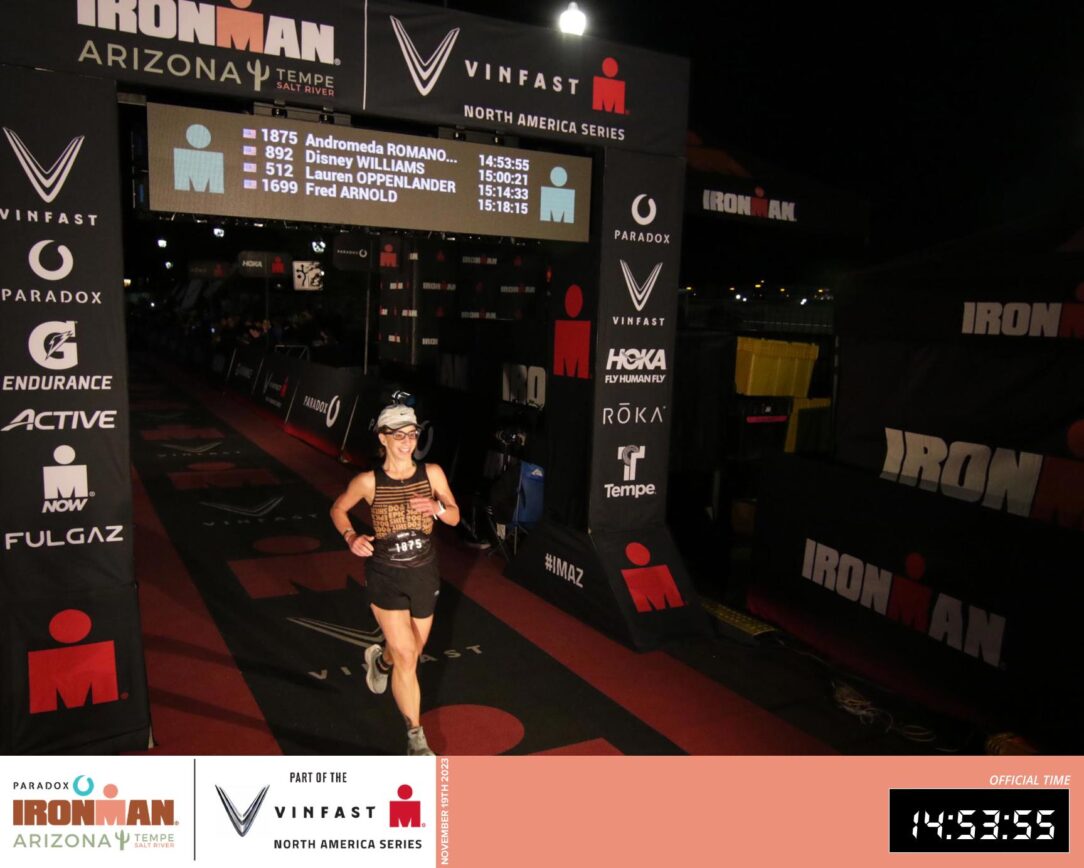Many of us have goals that feel so big, they’re almost shame-inducing. Why should a goal cause us shame? Maybe because we don’t want to admit our desires, especially if attainment seems unlikely. Maybe because we know that to achieve a big goal would be expensive or demand a lot of time away from our families or partners.
Think about your writing. Think about the biggest, most audacious goal you have. Is there something you’d love to accomplish which seems ridiculous even to pine for?
I have those writing goals, too. And I have some non-writing goals that act as both metaphor and laboratory, a way to learn about myself in ways that I know will end up circling back to writing, because nearly everything does.
Last month, I completed an Ironman triathlon, something that took two years of preparation, an “unlikely” journey for someone like me—unathletic, untalented, and middle-aged, with the regular assortment of chronic health issues, including back pain. I’ve blogged often about various fitness metaphors, and I’ll try not to bore you with the specifics of swimming, biking, and running here. But trust me: this really isn’t about triathlons. It’s about the small steps, attitudes, and expenditures that are essential to any mega-effort.
During my fifteen-hour triathlon, during which I not only performed to my potential but also had a really good time, these were the giddy lessons buzzing around my brain.
Incrementalism is everything. Even with a big goal, you have to focus on tiny steps. That’s true in training and even more true during the race itself. Thinking ahead to how much work it will take to write and publish a novel or learn to write a first screenplay (or swim, bike and run 140.6 combined miles) is overwhelming. You must learn to focus on what’s right in front of you. The next mile or the next fifty meters. The next paragraph or revised chapter or email to a prospective agent. Learning to Shrink Your World and Be Here Now (two of my most helpful mantras) is a skill. Practice and apply.
Dedicate adequate resources. I spent over $10,000 in race fees, travel expenses, gear, a bike fit, pool visits, chiropractor appointments, and much more. Someone reviewing our limited family budget would judge me foolhardy, especially when they saw all the normal, necessary things I couldn’t afford as a result. (My dentist, plumber, and car mechanic can all attest.) Now that the race is done and it was a blast and I feel the healthiest I’ve felt in years, the lesson is still sinking in—not that I overspent, but that I don’t spend enough or spend strategically when it comes to other major goals.
Early on my path to becoming a novelist, when I was a classic starving artist, subsisting on a freelance income, I splurged for writing retreats and conferences. But in some ways, I’ve started to backslide, fretting over things like minor conference fees. Now that I’ve done the Ironman, I actually think I should invest more in myself as writer. More DIY retreats to focus on writing. More networking trips. Whatever is required!
Reframing difficulty and embracing discomfort. For most of my triathlon training I assumed that if I just got fit enough, workouts would feel less hard. Only in my final months did I realize the task wasn’t eliminating discomfort (or doubt, pain, or resistance), it was making peace with it. Some things will always feel hard, but even pain can be separated from suffering. A bad review? A “pass” by a publisher? Those will hurt. But they don’t have to hurt deeply or for long.
Finding and accepting help. I tend to be solitary and overly independent. Triathlon forced me not to be. I needed advice from other athletes and coaches; I needed endless tolerance from family and friends; I even got over my squeamishness and fundraised 20% of my race costs. In your writing life, what kind of help could you leverage if you weren’t afraid to ask? Just as important, do you help others so that when your time of need comes, support will be available?
Interpreting and accepting setbacks. Two months before my Ironman New Zealand, where I was supposed to race for the first time, I got COVID. It was a huge financial loss and a strategic setback. Physically, I started back at square one. I had to keep training another nine months, leading up to the Arizona Ironman. Looking back now, I realize I wasn’t even close to ready for that NZ race. It would have been a disaster. By the time Arizona rolled around, I was truly ready and…could it be?…not even all that nervous.
Have you ever experienced rejection related to a writing project? We all have. Is it just slightly possible that more time might lead you to write a much better draft, and someday you’ll look back and be glad that your early draft didn’t get published? Major setbacks don’t feel like a gift, but they can be, especially when we need more time to develop ourselves and our writing.
Do you apply lessons learned in other areas of your life to writing? I’d love to hear about it.
Andromeda Romano-Lax is a book coach and the author of five novels. Her next one, The Deepest Lake (Soho Crime, May 2024) has been called a “can’t-miss thriller” (Laura McHugh, What’s Done in Darkness), and “at once a heart-pounding mystery and a profound take on the dangers of our confessional age” (Joanna Rakoff, author of My Salinger Year).

